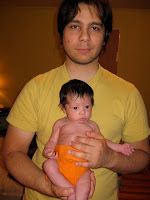Jodine's World's article "Milksharing on Facebook: One year later" sums it all up perfectly!!
It's been a whole year since Emma Kwasnica's Facebook milksharing network was launched. I can't believe it's been that long - seems like 10 minutes ago I was blogging about the six-month anniversary with my post, "A funny thing happened on the way to the milk bank."
Early on there were some bumps for global milksharing - understandable as 300 volunteer admins struggled to set up and run local communities using Facebook. Just as individuals struggle with the love-hate relationship with Facebook, so did the admins managing over a hundred community pages in 50 countries around the globe.Then there were some personality clashes - the original Eats on Feets Arizona community page founder parted ways with the global network after asserting her rights to her name. The global group became Human Milk 4 Human Babies (HM4HB) and while moms just kept right on offering up surplus milk and babes continued to receive it, the name change has hampered the growth of this network. There are still some Eats on Feets pages around and families new to milksharing can't always find their active local communities. And these days the Eats on Feets website has been hijacked by someone peddling breast implants and pregnancy diets, creating the potential for confusion for individuals and even reporters looking to do a feature on the one-year anniversary of the movement.
But Human Milk 4 Human Babies hasn't lost any steam and in September it sponsored the first World Milksharing Week with broad worldwide participation from Australia to Arizona.And although France joined the US and Canada with official warnings about the dangers of informal or Internet-based milksharing, three well-known academics published a supportive commentary in the International Breastfeeding Journal. "Milk Sharing: from private practice to public pursuit" has become the most accessed item on the IBJ website this year. Authors James Akre, Karleen Gribble and Maureen Minchin argue the risks of milksharing are manageable and conclude:

HERE to read the entire article on Jodine's World"this made-by-mothers model shows considerable potential for expanding the world's supply of human milk and improving the health of children." Akre, Gribble, Minchin, IBJ 2011
So much has happened in the past year. Human Milk 4 Human Babies has grown bigger and faster and busier than we ever thought possible at this time last year. Mothers are coming together all over the world to create "communities" to support each other and insure that babies are getting the breastmilk they need to grow and be strong and healthy. This is the Vision and Mission of HM4HB: to promote the nourishment of babies and children around the world with human milk. We are dedicated to fostering community between local families who have chosen to share breastmilk.
For more information about Human Milk 4 Human Babies, please visit the website at: http://hm4hb.net/index.html Visit the global fan page on Facebook: http://www.facebook.com/hm4hb
Our Vision
HM4HB is a global milksharing network, a virtual village, comprising thousands of people from over fifty countries. We are mothers, fathers, adoptive families, grandparents, childbirth and breastfeeding professionals, volunteers, supporters, donors, and recipients that have come together to support the simple idea that all babies and children have the right to receive human milk. We use social media as a platform for local families to make real-life connections and come together as sustainable milksharing communities where women graciously share their breastmilk. HM4HB is built on the principle of informed choice: we trust, honour, and value the autonomy of families and we assert they are capable of weighing the benefits and risks of milksharing in order to make choices that are best for them. We hold the space for them and protect their right to do what is normal, healthy, and ecological.
Breastmilk, the biologically normal sustenance for humankind, is a free-flowing resource and mothers of the world are willing to share it. Milksharing is a vital tradition that has been taken from us, and it is crucial that we regain trust in ourselves, our neighbors, and in our fellow women. Feeding any breastmilk substitute is not without risk and we support the families who know there is another option. We are the bridge that connects local families and brings them together again as milksharing communities. Indeed, the future of humanity depends on our return to sharing in a local and tangible way with one another.
We want milksharing and wet-nursing to be commonplace and babies to be fed at women's breasts whenever and wherever they need it. We dream of a world where mothers from previous generations pass on the tradition of breastfeeding and are a wealth of knowledge and support. We can forsee a time when women protect each other and help one another feed their babies so that every mother feels whole and no mother feels broken or that her body is failing her. We imagine a world where family members, friends, lactation consultants, doctors, and midwives do not hesitate to recommend donor milk when it is needed. We envision a future where families come together to raise this generation, and the next, by nourishing human babies everywhere with human milk and unconditional love.
Every person of the world is invited to join HM4HB. Page administrators, members, donors, recipients, and supporters are all important for building local, real-life communities where acquiring donor milk is no different than asking a trusted neighbor for an egg. We hope that one day in the future all babies in the world will thrive and grow on mother's milk, and HM4HB will no longer be needed because wet-nurses and breastmilk are available on every street, village, town, city, and island around the globe.








